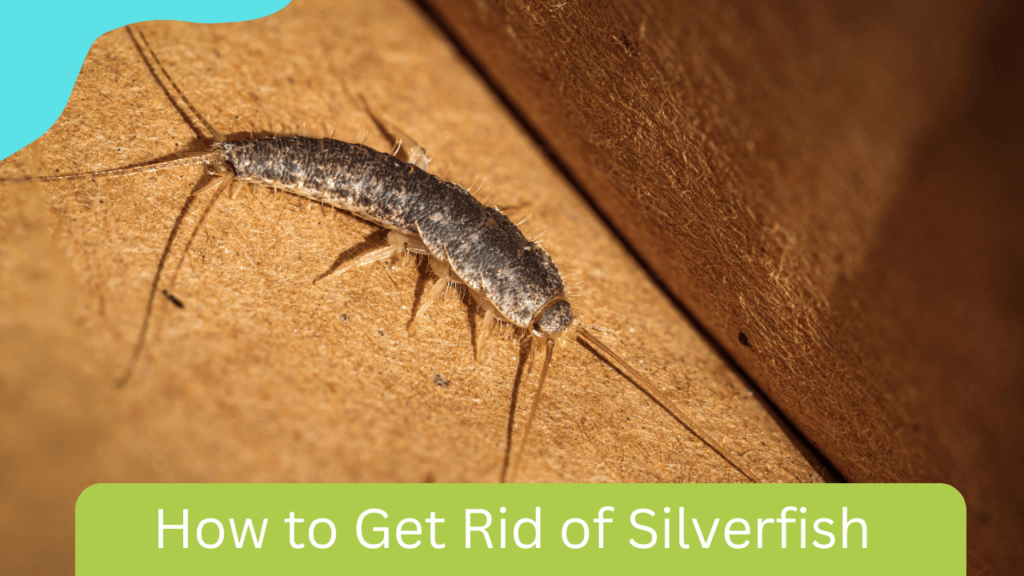Silverfish are tiny, wingless insects that can invade your home, particularly in damp and dark areas. Although harmless to humans, they can damage books, clothing, and wallpaper. If you’re dealing with a silverfish problem in Ireland, this guide will help you understand what they are, why they appear, and how to get rid of them effectively.
What Are Silverfish?
Silverfish are small, silver or grey-colored insects with long, slender bodies resembling fish, hence their name. They are nocturnal creatures, meaning they are most active at night. Here are some key details about silverfish:
- Size: Around 12–19 mm long.
- Habitat: Prefer dark, damp places like basements, bathrooms, and kitchens.
- Diet: Starch-based materials, such as paper, glue, and fabrics.
- Lifespan: Can live for 2–8 years.
Why Do Silverfish Appear in Your Home?
Understanding the reasons behind a silverfish infestation is essential to prevent and eliminate them. Common causes include:
- High Humidity: Silverfish thrive in humid environments with a moisture level of 75% or more.
- Dark and Undisturbed Areas: They prefer places like attics, cupboards, and basements.
- Food Sources: Leftover crumbs, paper, and damp clothing attract them.
- Poor Ventilation: Poor airflow can lead to moisture buildup, creating a perfect habitat for silverfish.
How to Identify a Silverfish Infestation
Look for these signs to confirm a silverfish problem:
- Sighting the Insects: Seeing live silverfish in dark areas or at night.
- Damage to Items: Holes or bite marks in books, wallpaper, or clothing.
- Yellow Stains: Small, yellow stains or droppings near damaged items.
How to Get Rid of Silverfish: Step-by-Step Guide
1. Reduce Humidity Levels
Silverfish thrive in moisture, so reducing humidity is key.
- Use a Dehumidifier: Install a dehumidifier to keep humidity below 50%.
- Ventilate Your Home: Open windows and use exhaust fans in bathrooms and kitchens.
- Fix Leaks: Repair any leaking pipes or taps promptly.
2. Clean Thoroughly
A clean home is less attractive to silverfish.
- Vacuum Regularly: Focus on cracks, corners, and areas behind furniture.
- Wipe Surfaces: Clean kitchen counters and floors to remove food particles.
- Declutter: Remove unnecessary papers, magazines, and cardboard boxes.
3. Seal Entry Points
Prevent silverfish from entering your home.
- Seal Cracks and Gaps: Use caulk to seal gaps in walls, windows, and doors.
- Install Door Sweeps: Add door sweeps to prevent insects from entering under doors.
4. Use Natural Remedies
Natural methods are effective and safe for your family and pets.
- Cinnamon Sticks: Place cinnamon in areas where you’ve seen silverfish. They dislike the smell.
- Diatomaceous Earth: Sprinkle this natural powder in cracks and corners. It dehydrates silverfish.
- Essential Oils: Use lavender or cedarwood oil as a natural repellent.
5. Apply Chemical Treatments
If the infestation is severe, chemical solutions can help.
- Insecticide Sprays: Use sprays specifically designed for silverfish. Apply in cracks and crevices.
- Silverfish Traps: These are sticky traps that capture and kill silverfish.
- Borax Powder: Mix borax with sugar and place it in infested areas. It’s toxic to silverfish.
Prevention Tips to Keep Silverfish Away
Once you’ve eliminated silverfish, follow these tips to prevent them from returning:
- Keep Your Home Dry: Use dehumidifiers and ensure good ventilation.
- Store Food Properly: Keep food in airtight containers, especially flour, sugar, and cereals.
- Inspect Books and Fabrics: Regularly check stored items like books, clothes, and paper.
- Regular Cleaning: Maintain a consistent cleaning routine, especially in dark and damp areas.
A Comparison Table: Natural vs. Chemical Methods
| Aspect | Natural Remedies | Chemical Solutions |
|---|---|---|
| Effectiveness | Good for mild infestations | Best for severe infestations |
| Safety | Safe for children and pets | Requires caution during use |
| Cost | Affordable | Can be more expensive |
| Ease of Use | Simple to apply | Requires careful handling |
When to Call a Professional Exterminator
If you’ve tried natural and chemical methods without success, it might be time to call a professional. Pest control experts can:
- Identify hidden infestations.
- Use advanced treatments for long-term results.
- Provide advice on preventing future infestations.
Frequently Asked Questions
1. Are Silverfish Dangerous?
Silverfish are not harmful to humans, but they can damage items in your home by feeding on paper, glue, and fabrics.
2. How Long Does It Take to Get Rid of Silverfish?
Depending on the severity of the infestation, it can take a few weeks to a few months to completely eliminate silverfish.
3. Can Silverfish Survive in Ireland’s Climate?
Yes, Ireland’s humid climate provides an ideal environment for silverfish to thrive, especially indoors.
Final Thoughts
Getting rid of silverfish in Ireland is achievable with the right approach. By reducing humidity, cleaning thoroughly, sealing entry points, and using natural or chemical remedies, you can eliminate these pests and protect your home. Remember, prevention is key to keeping silverfish away for good. If the problem persists, don’t hesitate to seek professional help.
With these steps, you can ensure your home stays silverfish-free and comfortable.

Hi, I’m Tanvir, the founder and author of Explore Ireland Now. With a deep love for Ireland and its rich culture, history, and landscapes, I created this site to share everything that makes this beautiful country worth exploring. Whether you’re a local looking for hidden gems or a traveler planning your next adventure, I provide insightful guides, tips, and recommendations to help you experience Ireland to the fullest.
From stunning landscapes to vibrant cities and quaint villages, Ireland is full of wonders waiting to be discovered. Through my personal experiences and research, I aim to bring you the most up-to-date information and inspiration for your journey.
Thank you for visiting Explore Ireland Now—I hope my content helps you uncover all that this incredible country has to offer! If you have any questions or need travel advice, feel free to reach out.



